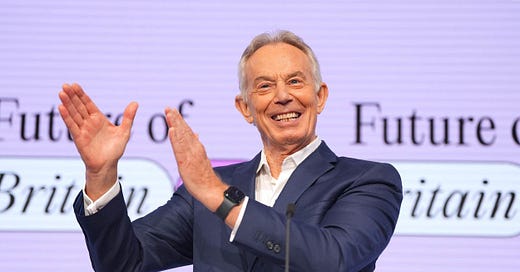#33: The Tony Bl-AI-r Show
This week: A deep dive into the weirdness of Tony Blair's conversion to AI and what he's forgotten about history // Plus this week's essential reading in the Creative R&D megaverse...
Hello hello.
This week I’m jumping over the ledge.
I’ll generally avoid politics here. But this week saw a political conference so damned weird I have to dig into it.
I’m giving myself the excuse that hey, it’s all digital content, right?
But see what you think. And let me know if you want more … or never again!
TROOPS, STAND BY FOR ACTION!
Technology! // Tony Blair’s The Future of Britain
The most interesting piece of digital storytelling this week didn’t happen in a gallery, a cinema, on TikTok, Steam or Netflix.
It was at a conference called The Future of Britain in a secret location in London, and streamed live online, led by former UK Prime Minister Tony Blair.
It set out a shared vision for new forms of government, industry and society that might be unlocked by the potential of artificial intelligence.
Coming less than a week after the UK general election put the Labour party Blair led through three election victories back in power, it was a deeply weird watch.
I couldn’t take my eyes off it - and apologies for anyone I had meetings with on Tuesday, it was hard to focus on anything else.
If you didn’t watch it, you should catch up on YouTube. It was compelling, an argument about an optimistic future which after the ultra-caution of the UK general election campaign felt genuinely hopeful.
I almost bought it.
Tony Blair is a high-end politician, able to sculpt a sense of the politically possible in real-time, and this was in its own way a brilliantly distilled take on what the AI revolution could bring.
But whenever politicians talk about hope it makes me really, really, really itchy.
And when you have an itch: get in and scratch it.
So below is my out-loud worrying about what that hopefulness really means and where it might lead us.
My take is shaped by the work of two brilliant writers, historian David Edgerton and political and social theorist Karl Polanyi.
So if this is all TL;DR, do nothing else but get yourself copies of their remarkable books, especially Edgerton’s The Rise and Fall of the British Nation and Polanyi’s The Great Transformation.
If your primary instinct is non-conformity to whatever view of history, politics or society, whether left, right or centre, they’ll re-wire your brain.
As I Walked Through the Wilderness of this World
The plot of The Future of Britain was a classic: Damascene conversion.
What Paul did on the road to Damascus, and what the Pilgrim did at the beginning of his progress, the former Prime Minister did when confronted by the potential of AI.
He had a moment of revelation.
Tony Blair’s gig is as CEO of the Tony Blair Institute, a political advisory and consultancy nearly 1000 people strong.
They are everywhere, deeply entangled both with the good and with many of the bad boys of geo-politics, like George Soros’ Open Society Foundation without the requirements to actually have an open society.
In his opening speech Blair set it out, that he’d had a moment of revelation and seen the future.
And in that future the solution to the many problems of the contemporary world was singular: artificial intelligence.
Good political communication is about simplifying the absurdly complex, and Tony hit a nail hard on the head. Our problems are huge, but AI, applied right, could be the general purpose technology primed to fix them all.
Blair’s not new to a turn to faith.
His final years as Prime Minister, his reputation shattering in face of the lies underpinning the Iraq War, became a quest for forgiveness that led him to convert to Catholicism.
This was the first deep oddity of The Future of Britain: At its heart it was a religious profession of faith, dressed up in the graphs and KPIs of technocratic political economy, but ultimately a converted evangelical preacher’s cry to a new found God.
Nothing new under the sun
The second great oddity in the Future of Britain was its belief in the novelty of its own conclusions.
A UK Prime Minister - even an ex one - professing to find the solutions to society’s ills in the potential of science and technology is 10000% not a surprise.
Honestly, it is the solution of every single Prime Minister at least since Churchill, and why Tony Blair, not unaware of history, thought this was new is baffling.
UK Prime Minister’s addiction to betting big on science and innovation is a story brilliantly told by David Edgerton across three books: The Rise and Fall of the British Nation; the British War Machine and The Shock of the Old: Technology and Global History since 1900.
Edgerton tells amazing, half-forgotten, stories about Winston Churchill’s hopes that British scientific breakthroughs would win both World War I and II. Whilst his role in the invention of the tank was as a useful protector of radical R&D, his attempts to create a trench-boring machine between 1939-1943, codename Nellie, were wildly foolish.
And if Churchill’s failed attempts to “big science” his way out of two world wars have been subsumed in his wider legend, then Harold Wilson - the last Labour Prime Minister until Blair - with his famous embrace of the White Heat of Technology speech of 1963 should at least have stirred some of Blair’s embers.
Even more recently, Boris Johnson back in 2021, fresh from the brilliance of the COVID Vaccine development, promised to science-us towards economic recovery.
We have spent too long in a state of semi-detachment from science, as though it was something intimidating and remote from our lives. Too many people in our country lack training in science and technology, too many children think STEM subjects are not for them.
Most glaringly of all, this country has failed for decades to invest enough in scientific research, and that strategic error has been compounded by the decisions of the UK private sector.
And only last year, Rishi Sunak launched a Science and Technology Framework designed to make us into a “superpower” by 2030.
It’s a bizarre state of amnesia that I can’t really explain.
From one generation of Prime Minister and government to the next, and whether Labour or Conservative, the answer is always the same answer, delivered like Archimedes jumping out of his bath or Isaac Newton underneath his apple tree.
“Guys, guys, I’ve got it. We can fix things. We can solve it all. LET’S SCIENCE.”
I’m not a flat-earth doofus.
But I am a deep-down Nietzschean and happy to make unfashionable observations.
So when the answer to the deep and deepening problems of Western Democracy - whether climate change or demographic ageing, education or healthcare - is always the same, and when both the potential of that solution goes ever unrealised, and the problems keep getting worse not better, I smell a rat.
Or at least a diversion tactic.
I think what we’re being diverted from is the cost of change.
It all comes back to hope.
Tony Blair, like St. Paul, is a world-class salesman for hope. Hope is about something better yet to come. Paul wrote in Romans 8:
But hope that is seen is no hope at all. Who hopes for what they already have? But if we hope for what we do not yet have, we wait for it patiently.
But the thing with hope, and that bit where you wait patiently for it to arrive, is that you have to through a lot of pain before it does.
I loved The Neverending Story when I was a kid, and the bit where Bastian loses his beloved horse Artax in the swamp of despair is where I think all this hopefulness will lead us before we get to the good bit on the other side.
If we commit with passionate hopefulness to AI and its possibility for global transformation on the scale of the Industrial Revolution, then we need to push away our collective politician-led techno-amnesia and get real quickly about remembering how awful those early decades of early 19th century industrialisation really were.
Karl Polanyi in The Great Transformation, along with Marx in Das Kapital, is the great documenter of that. Their books stand up for the memory of what and who it cost us to get here.
The industrial revolution made the modern world.
We have everything to thank it for.
But it was built on the blood and guts and death of the poor, on the bodies of slaves and factory workers, uneducated kids and abused women, all those whose lives went unprotected as the middle class got rich and the really rich got really, really, really rich.
A lot of die-hard capitalists find that hard to stomach.
But if they shrug off all that death and pain they’re no better than the Stalinists or Maoists for whom pain was always part of the plan.
AI may get us somewhere.
It hasn’t got us anywhere yet.
But if we embrace it with religious zeal, if we treat it like the believers Blair asked us to be, we are damned to the horror and loss of another great transformation on the road.
I voted for Tony Blair. Three times.
He and his generation feel like giants compared to the politicians we have now.
But on AI, his hopefulness is wrong. And dangerous.
Don’t believe it. Disbelief is strength.
This month I am super-super delighted to partner with Existent, a full body, free roam VR developer tool launching in Beta THIS TUESDAY 16th JULY.
And even more delighted that newsletter readers will get 50% off!
Existent’s holistic, end-to-end application framework simplifies the entire creation process of building physically interactive, free roam, full body VR applications. The result? More robust, realistic virtual reality applications built in less time, for less money.
Full body, free roam multiplayer VR is going to unlock a whole new wave of location based experiences, but it will take the end-to-end suite of components, blueprint nodes, assets, editor tools and runtime systems that Existent have created to make it go fast.
Ever since the excellent Leah Kurta joined as Head of BD and Research from i2 Media last year i’ve been dying to try it out.
Now you get to. Go to existent.com and use the code ExistentCRD and you’ll get an amazing 50% off.
Get going!
Ideas! // Stories from the digital edge
There has been a ton of good stuff to read this week.
Old friend and newsletter reader
is writing a brilliant, deep newsletter. This take on the potential of indigenous perspectives to help shape AI design is amazing. MUST READ.LOVED this piece on Art UK - CEO Andrew Ellis and lots of the team are newsletter readers - about why hands are so difficult to draw, and why AI’s will have such a hard time rendering them. Brilliant bringing together of art history and tech theory.
Air were a band who pretty much passed me by, except that Sexy Boy song which you couldn’t ignore 10 years ago, but I love the stage design of their latest tour. From Dezeen:
'Air Play Moon Safari' is the French band's latest tour, as they play their intimate, retro-futurist classic album, in full, from a five-sided, white-walled, 21:9 aspect-ratio letterbox that faces its voyeuristic audiences like Hitchcock’s Rear Window property as reimagined by Californian modernists. 'It could be a home, it could be our world, our head… our architectural concept,' they say of the project.
Another nice newsletter from a reader.
’s Cultural Content is a really useful take on museum digital - her essay on videogames and museums goes off in a tonne of unexpected directionsI’ve written before about tech analyst Ben Evans. Having said this was the year where AI was the only story in town back in December, he’s now shaping the argument that we may be in white elephant territory
- is an important VC. He may also be going mad. This very long essay called the “little tech agenda” is really weird. Like an acid-casualty Jimmy Stewart in Mr Smith Goes to Washington, it’s a multi-billionaire standing up for the little guy tech start-ups in face of regulatory capture and big tech self-protectionism. The last newsletter I read by Marc he was advising everyone to take up MMA so you could defend your families against the coming Purge. People. Crazy.
Phew. I burnt myself out writing that Blair piece so that’s enough for this week.
Hope you enjoyed.
Leave a comment.
XOXO
NB, “As I walked through the wilderness of this world” is the opening line of John Bunyan’s Pilgrim’s Progress. “Nothing new under the Sun” is from Ecclesiastes.
NB,NB, here’s a great video with David Edgerton









